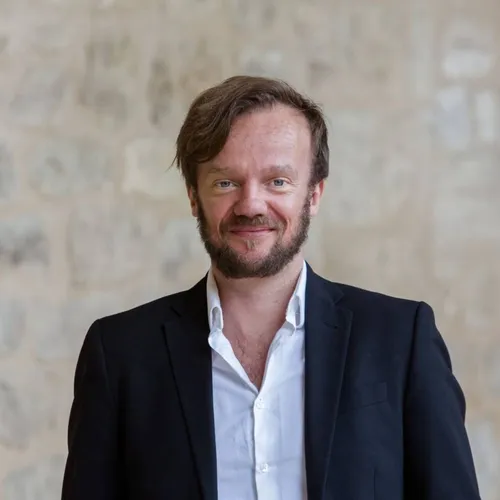
Oscar Bianchi is a Berlin-based composer of Italian and Swiss descent, whose music blends rigorous structural thinking with visceral emotional power. He studied composition, choral conducting, and electronic music at the Conservatorio Giuseppe Verdi in Milan, completed IRCAM’s master’s program in Paris, and earned a doctorate from Columbia University under the guidance of Tristan Murail and George Lewis.
His critically acclaimed first opera, Thanks to My Eyes—created with director Joël Pommerat and premiered at the Festival d’Aix-en-Provence—has toured internationally. His cantata, Matra, alongside a growing body of staged, participatory, and chamber works, continues to surprise audiences and critics alike with its depth, humor, and unwavering commitment to the primacy of expression.
His music has been performed by many of today’s foremost ensembles and orchestras, including the Gewandhausorchester Leipzig, the Bavarian Radio Symphony Orchestra, the Radio France Philharmonic Orchestra, the DSO Berlin, Ensemble Modern, JACK, and Klangforum Wien.
A recipient of numerous prestigious awards—including the Rome Prize (Villa Massimo), Gaudeamus Award, DAAD Artists-in-Berlin Fellowship, Grand Prix Sacem, International Rostrum of Composers Prize, and German Record Critics’ Award—Bianchi is also the founder and Artistic Director of the renowned International Young Composers and Conductors Academy in Ticino, Switzerland.
Pozzanghere | mezzo seccate (Puddles | half dried up) is the third part of an ongoing exploration of the voice as a privileged medium—an instrument not only of expression, but of transformation.
In Matra, an hour-long cantata that draws on the outputs of Mary Magdalene, Lucretius, and the Vigyan Bhairav Tantra, the voice bears the weight of existence and longing, emerging as a space where sound becomes self-experience. In Thanks to My Eyes, the operatic form enables a confrontation with pain through narrative: music becomes the terrain where myth and dramaturgy reclaim time, and where the voice renders intelligible what resists language.
In Pozzanghere, the voice enters a new paradigm: it no longer narrates, adorns, seduces, or symbolizes. It inhabits a liminal space—between impulse and construction, breath and structure. It is neither character nor commentary, but a condition. It does not represent: it reveals. A threshold through which the listener is invited not to observe, but to participate. An inward journey shaped by tension, not function; presence, not projection.
The piece is also an homage to "I limoni" (The Lemons), the opening poem of "Ossi di seppia" by Eugenio Montale. Its title evokes transience and fragility—puddles half-dried up—metaphors for time evaporating under the heat. Montale’s poetic world, with its raw clarity and resistance to rhetorical excess, mirrors my own musical ideals: a commitment to precision that does not exclude emotion, and to expression stripped of embellishment.
This duality pervades the entire ensemble. The string quartet, double bass, and accordion conjure a fluid and mysterious sonic landscape—capable of dissolving identities through blending. In contrast, piano and percussion anchor the music in the concrete and corporeal. Yet through extended techniques—bows on metal, horsehair gliding across piano strings—they too transcend their percussive roots, reaching toward resonance and suspension.
Suspended between these poles are the soprano and trumpet. The soprano’s role is deliberately amphibious: she is both body and breath, sound and speech, traversing the threshold between lyricism and raw impulse. The trumpet, her reflection or nemesis, shadows and distorts her—doubling, contradicting, or destabilizing the voice’s claim to singularity. Together, they shape a field of friction and intimacy, of crossings and abstraction.
Pozzanghere | mezzo seccate unfolds not as a series of episodes, but as a continuous flow. Like the puddle it evokes, it reflects and distorts, absorbs and evaporates. The voice in this work is not the bearer of meaning or emotional excess, but something more essential: a creolized space where instinct and technique, memory and potential, body and culture converge—not to resolve their differences, but to inhabit them fully.
Oscar Bianchi (with Jérémie Szpirglas)